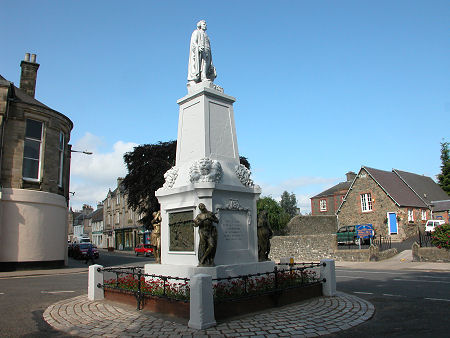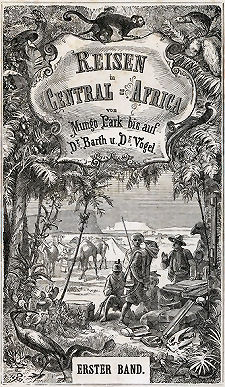 Statue of Mungo Park, Selkirk |
Mungo Park lived from 11 September 1771 to December 1805 or January 1806. A native of Selkirkshire, he made his name as an early explorer of the African continent. The wider picture in Scotland at the time is set out in our Historical Timeline.
Mungo Park was born at Foulshiels near Selkirk, where his father was a successful farmer. The seventh of a family of thirteen he was well educated. After leaving school he took up an apprenticeship with a surgeon in Selkirk, then spent the three years from 1789 to 1791 gaining his formal qualification as a surgeon.
Park's first job was as an assistant-surgeon on board the East India ship Worcester. While on board he made a trip to Sumatra and after returning to Scotland produced an academic paper describing eight previously unknown fishes he had found there.
In 1794 Park applied to the Africa Association to mount an expedition to build on the work of Major Daniel Houghton, who had gone to Africa in 1790 to try to trace the route of the River Niger, but had died in the Sahara. The Niger is an odd river. At 2,500 miles long, it is the third longest in Africa. Oddly enough, it rises just 150 miles from the sea before heading north-east into the Sahara desert where it passes Timbuktu before taking a sharp right turn and flowing south-east to the sea.
Timbuktu's existence, and the fact that a great river ran through it from the south-west, had long been known, and it was assumed that this was the Niger River that entered the sea in what is now Nigeria.
Park's strategy was to to approach from The Gambia in west Africa. Starting on 21 June 1795 he travelled 200 miles up the Gambia River before striking out east into the unknown interior. At one point he was imprisoned by a Moorish chief for four months, but he escaped and eventually found the River Niger. After tracing its route for 300 miles he made his way back west to The Gambia. He returned to Scotland on 22 December 1797, long after he had been given up for dead.
Park settled back to a routine life in the Borders. He married in 1799, and in 1801 set up practice as a doctor in Peebles. In September 1804 Mungo Park accepted a government invitation to lead a further expedition to the Niger. He sailed from Portsmouth for The Gambia on 31 January 1805, commissioned as a Captain. Second in command was his brother in law, who had been commissioned as a lieutenant.
The full expedition that set off inland from The Gambia comprised three officers and some 40 other Europeans, mostly British soldiers, plus local guides and a number of slaves. The expedition reached the River Niger in August 1805, by which time only 11 Europeans were still alive, the remainder having died of dysentery or fever. For some time they retraced Park's steps on his earlier expedition with the permission of the local ruler.
On 19 November 1805, Park set sail downstream into the unknown reaches of the river in a large canoe with what remained of his expedition. By now this was just Park himself, one British officer and three soldiers (one by now mad), a guide and three slaves. Park sent another guide back to The Gambia with letters for his wife and the Colonial Office. In these he said that he was very well equipped and supplied, and that he intended to sail without landing and non stop downstream until he reached the sea, which he estimated to do at the end of January 1806.
Park's route along the river would have taken him north-east through western Africa, then into the Sahara and past Timbuktu, then south-east through modern day Niger and Nigeria to the sea. He never made it. The Government employed the guide who had delivered Park's last letters to return to try to discover his fate. The story that emerged was one of heroic failure. Park is believed to have sailed downstream for a further 1,000 miles, past Timbuktu, through Niger and into north-west Nigeria. His policy of avoiding contact with local tribes caused steadily increasing opposition along the route, but attacks were successfully fought off with the available guns. But at the Bussa Rapids near Yauri in Nigeria, the canoe became stranded on a rock, and the party again came under attack from native tribesmen. It is believed that Park and the remaining three other Europeans were drowned trying to escape, and the only survivor of the expedition was a slave who was able to recount the end of the expedition.
Some of Park's belongings were eventually recovered, but Park's final fate remains unclear. In 1827 Mungo Park's second son Thomas set out to discover whether his father might have survived as a prisoner: but died of fever before he had gone very far into the interior.


